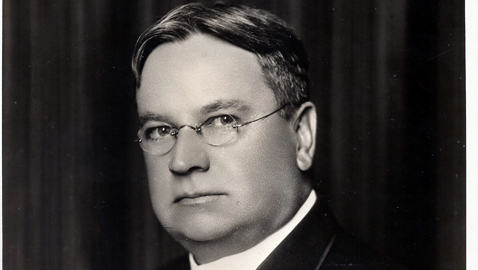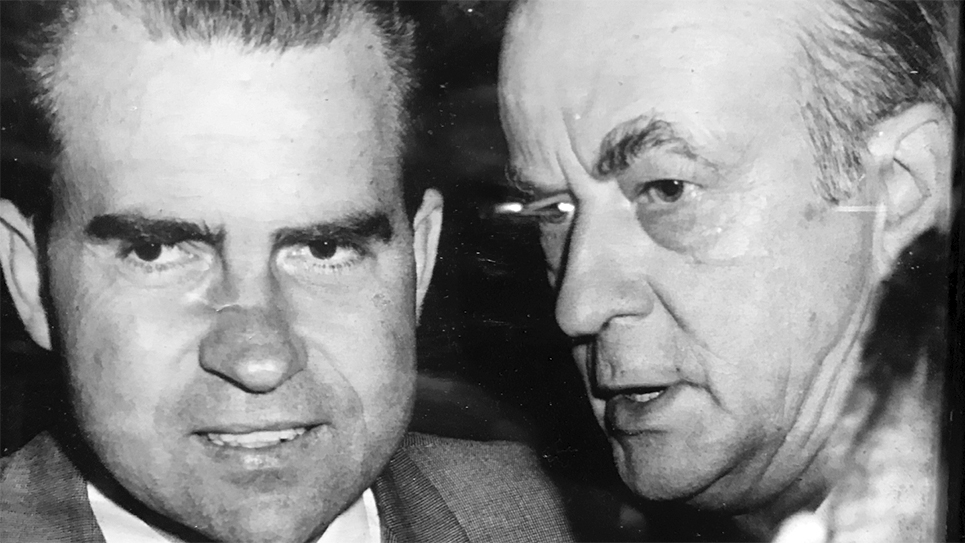Few politicians enjoyed the lengthy career Hiram W. Johnson carved out in California. Johnson’s time in public office was stormy, yet he remained enduringly popular. By the time of his death in 1945, Hiram Johnson was a living icon in his home state.
Johnson was born on September 2, 1866, the son of Grove L. Johnson who was himself quite active in Republican Party politics. The elder Johnson served in both houses of the California state assembly, as well as one term in Congress. Hiram did not exactly follow in his father’s footsteps, as the two men had very different views on public policy.
Hiram Johnson earned a law degree and set out to practice his profession; perhaps the most famous trial of his career was the prosecution of corruption in San Francisco local government. The original prosecutor, Francis Heney, was actually shot in the head after he had pointed out one of the jurors had served time in San Quentin. Fortunately, Heney survived a wound that was close to being mortal. Hiram W. Johnson was chosen to finish the trial, which he did. Supposedly, four of the jurors had been bribed, a fact which was brought to Johnson’s attention. Johnson dramatically pointed to and called out each of those jurors by name and thundered, “You dare not acquit these men!”
The jury, fearful, did not acquit the accused.
By 1910, Hiram W. Johnson was running for governor of California on a progressive platform. Johnson decried the influence of the Southern Pacific Railroad in California politics, proposed U. S. senators be elected by popular vote, and supported giving women the right to vote.
Once governor, Johnson proceeded to reform California’s government. It was Hiram Johnson who introduced referendum, recall elections, and voter initiatives to California, all of which still exist to this day.
Johnson’s popularity in California would continue to grow, although his appearance belied that of one that would become an institution. Short, bespectacled, with a tendency to being stout, a full head of hair parted in the middle, Hiram Johnson did not physically strike a commanding figure, yet his force of personality made him exactly that. Johnson was an excellent orator and possessed a certain kind of charisma that drew people to him.
Johnson bolted the Republican Party in 1912 to run with former President Theodore Roosevelt on the Progressive or “Bull Moose” ticket in 1912. The Roosevelt – Johnson ticket actually carried California against Democrat Woodrow Wilson and incumbent President William Howard Taft. In fact, the Progressive ticket ran second nationally all across the country, leaving President Taft to run a poor third. Still, the deep division in the Republican Party allowed Woodrow Wilson to win the presidency.
Hiram Johnson remained in office as governor of California and was reelected to a third two-year term in 1914. Johnson became a candidate for the United States Senate in 1916 and was elected. He was to remain in the Senate until his death in 1945.
For the rest of his life, Hiram Johnson would remain one of the most important progressives inside the Senate and the country. He ran for the Republican presidential nomination in 1920. The untimely death of Theodore Roosevelt left it an open contest, which drew numerous aspirants. The late president’s family chose not to support Johnson, preferring to back the candidacy of General Leonard Wood. The ultimate nominee was Ohio Senator Warren G. Harding.
Johnson was not especially supportive of either the Harding or Coolidge administrations and the Californian quickly became disillusioned with that of Herbert Hoover. Senator Johnson openly backed New York Governor Franklin Delano Roosevelt against Hoover in 1932. Johnson supported many of the New Deal measures of Franklin Roosevelt’s administration as well as the president’s reelection bid in 1936.
The turning point for Hiram Johnson with Franklin Roosevelt came in 1937 when the president proposed to enlarge the Supreme Court. Johnson was utterly opposed to FDR’s court packing plan and when the bill was finally defeated, Johnson murmured, “Thanks be to God!”
Senator Johnson was also a fierce isolationist, along with several other progressive Republicans. Johnson was adamantly opposed to legislation he thought might entangle the United States in yet another foreign war. Johnson had been bitterly opposed to Woodrow Wilson’s cherished dream of having the United States join the League of Nations. Along with Idaho Senator William E. Borah, Johnson followed Wilson across the country, denouncing the League.
President Roosevelt, anticipating war to break out in Europe at any moment, tried hard to craft legislation to help America’s allies, while trying not to arouse the powerful isolationist block in Congress. To say the least, it was a delicate balancing act, which would have been impossible for a politician less deft than FDR. Despite the powerful isolation bloc in Congress, isolationist sentiment in the United States melted like a snowman in Hell on December 7, 1941 when the Japanese Empire attacked Pearl Harbor.
Senator Johnson’s popularity in California had not been dented by his isolationism; in fact, he had been reelected to another six-year term in 1934 with over 94% of the vote. Johnson had also been easily reelected in 1940.
Johnson’s health was beginning to fail during the 1940s. He suffered a stroke, which reduced his once booming voice to a whisper. Johnson was frequently absent from the Senate and while he participated in committee meetings, his days of making thunderous speeches on the floor of the Senate were behind him.
Johnson’s wife, Minnie, became his keeper, appearing at committee meetings to lead him out of the room when she thought he needed to rest. Johnson, usually puffing on an ever-present cigar, which was carefully placed in a holder, would meekly follow his wife out of the room.
Still, Hiram Johnson tenaciously clung to his perch in the Senate and whenever there was some discussion of his health, the senator would snap he was quite well and would, in fact, be a candidate for reelection in 1946 when he would be 80 years old.
Yet many of Johnson’s contemporaries, especially those who had been fierce isolationists had been driven out of the Senate. William Borah, the “Lion of Idaho” had died in 1940; Gerald Nye of North Dakota was defeated in 1944, as was D. Worth Clark of Idaho. The remainder of the isolationist block exited the Senate the year after Johnson’s death. Burton K. Wheeler of Montana, Henrik Shipstead of Minnesota, David I. Walsh of Massachusetts all lost reelection bids.
Senator Hiram Johnson probably would have defied the odds and sought another term in the Senate, but he suffered another stroke and died in the Bethesda Naval Hospital on August 6, 1945.
The news coverage of the old titan’s passing was diminished due to the fact the United States had just dropped an atomic bomb on Hiroshima. The irony of the old isolationist being consigned to the back pages due to international events was not lost on many.
Clearly Hiram Johnson likely died at precisely the right time. The times were changing and the United States was changing with them. Johnson was a relic from a different time, a once powerful voice and figure reduced to an angry whisper by age and infirmity, Much of Hiram Johnson’s political philosophy, especially in the area of foreign policy, was outdated as World War II drew to a close.
Still, Hiram Johnson was a legendary figure.
The laws in California changed to give the people a greater voice in the running of their government have been much debated throughout the succeeding decades, although they remain in place. Hiram Johnson was selected to be one of the inductees when the California Museum kicked off a new exhibit in 2009. Johnson’s legacy continues to live on long after his death.







